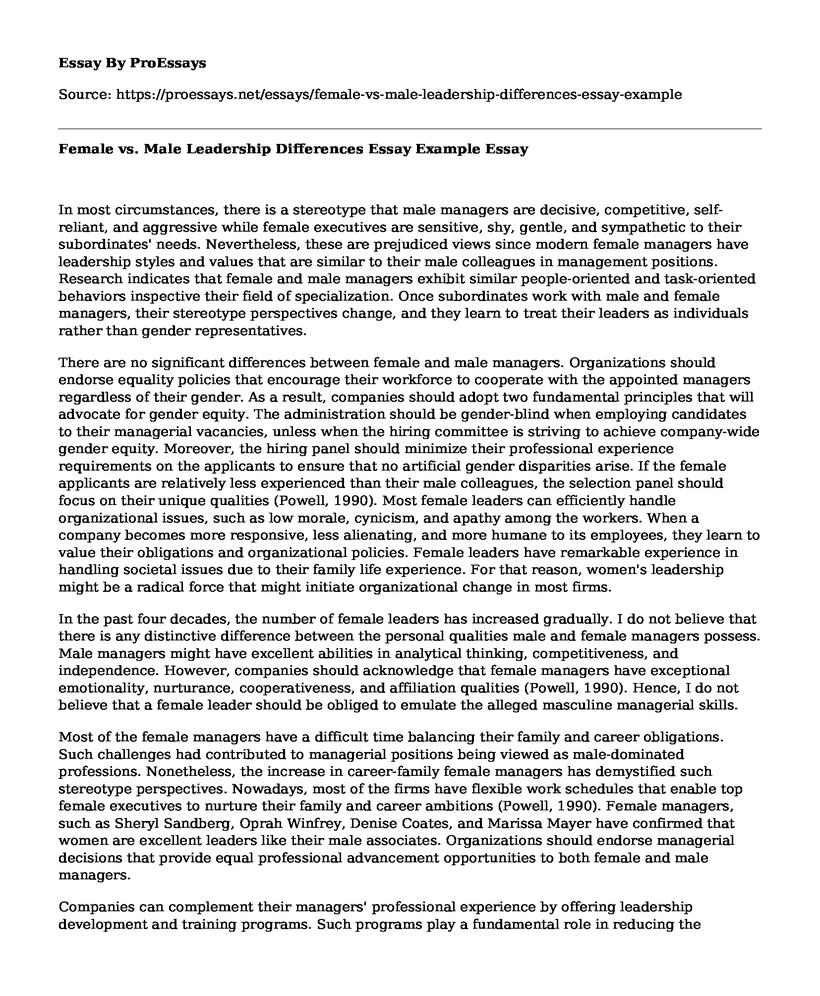In most circumstances, there is a stereotype that male managers are decisive, competitive, self-reliant, and aggressive while female executives are sensitive, shy, gentle, and sympathetic to their subordinates' needs. Nevertheless, these are prejudiced views since modern female managers have leadership styles and values that are similar to their male colleagues in management positions. Research indicates that female and male managers exhibit similar people-oriented and task-oriented behaviors inspective their field of specialization. Once subordinates work with male and female managers, their stereotype perspectives change, and they learn to treat their leaders as individuals rather than gender representatives.
There are no significant differences between female and male managers. Organizations should endorse equality policies that encourage their workforce to cooperate with the appointed managers regardless of their gender. As a result, companies should adopt two fundamental principles that will advocate for gender equity. The administration should be gender-blind when employing candidates to their managerial vacancies, unless when the hiring committee is striving to achieve company-wide gender equity. Moreover, the hiring panel should minimize their professional experience requirements on the applicants to ensure that no artificial gender disparities arise. If the female applicants are relatively less experienced than their male colleagues, the selection panel should focus on their unique qualities (Powell, 1990). Most female leaders can efficiently handle organizational issues, such as low morale, cynicism, and apathy among the workers. When a company becomes more responsive, less alienating, and more humane to its employees, they learn to value their obligations and organizational policies. Female leaders have remarkable experience in handling societal issues due to their family life experience. For that reason, women's leadership might be a radical force that might initiate organizational change in most firms.
In the past four decades, the number of female leaders has increased gradually. I do not believe that there is any distinctive difference between the personal qualities male and female managers possess. Male managers might have excellent abilities in analytical thinking, competitiveness, and independence. However, companies should acknowledge that female managers have exceptional emotionality, nurturance, cooperativeness, and affiliation qualities (Powell, 1990). Hence, I do not believe that a female leader should be obliged to emulate the alleged masculine managerial skills.
Most of the female managers have a difficult time balancing their family and career obligations. Such challenges had contributed to managerial positions being viewed as male-dominated professions. Nonetheless, the increase in career-family female managers has demystified such stereotype perspectives. Nowadays, most of the firms have flexible work schedules that enable top female executives to nurture their family and career ambitions (Powell, 1990). Female managers, such as Sheryl Sandberg, Oprah Winfrey, Denise Coates, and Marissa Mayer have confirmed that women are excellent leaders like their male associates. Organizations should endorse managerial decisions that provide equal professional advancement opportunities to both female and male managers.
Companies can complement their managers' professional experience by offering leadership development and training programs. Such programs play a fundamental role in reducing the stereotype views on female executives' professional experience. The leadership development programs usually offer various professional courses that are customized to cater to the different managerial leadership skills women and men in leadership lack. Similarly, some corporations, for instance, Northwestern Bell have launched their leadership programs that are strictly meant for women (Powell, 1990). I believe such voluntary programs will ensure that women who are ambitious to be leaders have a conducive environment to acquire the required managerial ideas and experience.
Conclusion
The hiring panel should not use stereotype views to appoint their managers. Conversely, it should acknowledge that either sex can produce poor, average, and excellent managers. As a result, to obtain outstanding directors firms need to promote, inspire, nurture, and identify good leaders, irrespective of their gender.
References
Powell, G. (1990). One More Time: Do Female and Male Managers Differ? Academy Of Management Perspectives, 4(3), 68-75. doi: 10.5465/ame.1990.4274684
Cite this page
Female vs. Male Leadership Differences Essay Example. (2022, Dec 20). Retrieved from https://proessays.net/essays/female-vs-male-leadership-differences-essay-example
If you are the original author of this essay and no longer wish to have it published on the ProEssays website, please click below to request its removal:
- Essay on Strategies of Interest Groups
- Essay on Dulce Pinzon: The Real Story of the Superheroes
- Family Life Education (FLE) Essay Example
- Social Physiology and Cognitive Dissonance Paper Example
- Collective Consciousness: Uniting Primitive and Modern Societies - Essay Sample
- Essay Example on the Time Value of Money: Analyzing Financial Decisions for Businesses
- Essay Sample on 7 Steps to Transform an Organization's Culture







